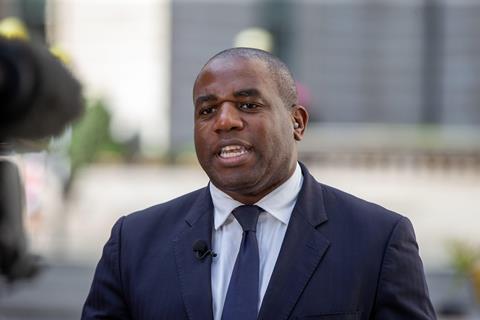The fact that only 1% of partners at major firms are black is ‘diabolical’, the MP who led a landmark race review of the criminal justice system has said – urging management to get a grip on the problem.
Shadow foreign secretary David Lammy MP was speaking at an online event, attended by more than 500 people, to discuss ‘The 1% Study’, a comprehensive research report by extense, a legal sector inclusion consultancy led by Julian Richard, on underrepresentation of black solicitors at partnership level.
Having qualified 27 years ago at the bar alongside people from black, Asian and minority ethnic backgrounds, and aware of people before him who are from diverse backgrounds, Lammy said there were no pipeline issues. The issue, he said, concerned retention and progression. ‘We have to grip this issue square on. How do we do that?’
Lammy was pleased to see the study urge firms to tie executive compensation to diversity and inclusion outcomes. ‘It is important that those who lead our law firms grip that and understand their responsibilities. Bonuses and acceleration in a firm ought to be measured against that backdrop because that 1% figure is diabolical against the proportion of black and mixed heritage people in our society. There is a lot to do.’
The study also urges firms to interrupt work allocation bias using technology and people-based solutions, introduce formal sponsorship programmes and provide targeted equitable support and career development opportunities.

Highlighting why such actions are important, David Ziyambi, a partner at Latham & Watkins, said: ‘At the beginning of my career, I felt I was spending 70% of my energy just fitting in. I spent 30% of my energy excelling as a lawyer and honing my craft as a lawyer. It was a real challenge because there are a lot of people around you not having that issue. The probability of promotion rises when you can increase the energy spent being a better lawyer and decreasing the energy trying to assimilate.’
David Ampaw, a partner at DLA Piper, explained that mentors provide advice and answer questions. A sponsor ‘promotes you to other people to help advance your career, someone who shouts for you when you’re not in the room’.
Akima Paul Lambert, a partner at Hogan Lovells, said work allocation was key in making sure black talent rises to the top. She recalled, when she was a junior associate, wanting to travel to Hong Kong for work. ‘I was told, rightly or wrongly, “they do not like people like you in Hong Kong so you should not go to Hong Kong. Why don’t you go to Paris instead”. This was my reality. This was not 50 or 40 years ago. This was 15 years ago. This closed another segment of the market to me, another jurisdiction. One of the moments of my life when I realised that how work is allocated and who it was allocated to needed reform.’
Later in her career, a partner chose Lambert to handle an important matter. The partner said others had already been given high-profile work - it was her turn. ‘That matter was so important to my development, to the firm. It was so important to the clients I met, in terms of exposure to barristers who went on to vouch for me.’
The 1% Study was sponsored by Herbert Smith Freehills, Linklaters, DLA Piper, Latham & Watkins and Hogan Lovells. The Law Society, Black Solicitors Network and Solicitors Regulation Authority are among those who have endorsed it.


























